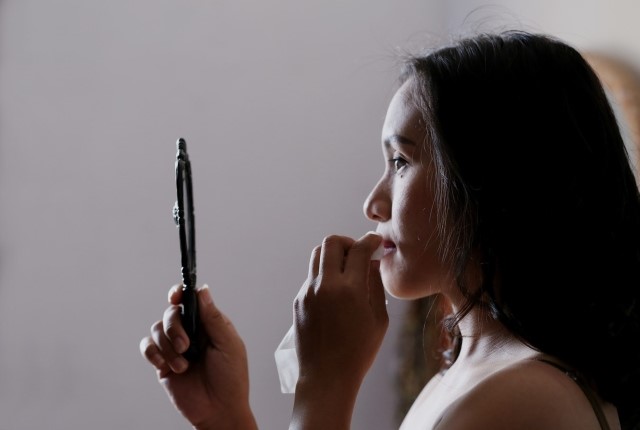
Body + Mind is reader-supported. We may earn an affiliate commission when you buy through some of the links on our site.
Acne affects a lot of people — in fact, it’s the eighth most common disease worldwide. One myth is that acne is caused by not washing your face, but there are a lot of reasons you might be experiencing a sudden breakout. People who scrub and exfoliate each day can still get pimples. “But why is my face breaking out all of a sudden,” you may ask? There are answers.
From extra stress to the wrong laundry detergent, below are six things that could be causing your random breakout — and what you can do to fight back!
When your hormones are out of whack, like during your period, you can experience a variety of unpleasant side effects, including acne. Hormonal breakouts, called acne vulgaris, are typically caused by a rise in androgens like testosterone. High androgen levels trigger the production of sebum, which boosts skin cell activity and increases inflammation.
There are four types of acne caused by unbalanced hormones, including papules, pustules, nodules and cysts. While they have different names, the result is still the same — an annoying breakout. If you think hormones cause your acne, consult with your dermatologist about treatment options.
If you’ve noticed breakouts consisting of tiny bumps along your forehead and hairline, the culprit could be your hair care products. Some of them contain oil, which can find its way to your skin and clog pores. These oily conditioners, gels and scalp treatments cause whiteheads and papules, which are flesh-colored bumps.
The most common products containing oil include:
Seek products that are oil-free and look for words like noncomedogenic and non-acnegenic on the back of the bottle.
“Why is my face breaking out all of a sudden? After all, I use facial scrubs.” It’s a common belief that scrubbing away at your skin will clear up acne, but that’s not the case. Facial scrubs only work on the skin’s surface — they are unable to penetrate the dirt and oil deeper in the pores. While your skin might feel smooth and soft after a nice scrubbing, it won’t help prevent or treat acne. Some facial scrubs can do more harm than good, irritating skin that is inflamed due to a breakout and making the problem worse.
You can still exfoliate your skin — but you should avoid products that contain abrasive particles. Instead, choose over-the-counter chemical exfoliants that dissolve the bonds holding dead skin cells. Some of the most effective exfoliants include alpha hydroxy acid and salicylic acid, which stimulate collagen production.
Some of the foods you eat can aid in the development of acne. Research has shown people who eat added sugars have a 30% greater chance of developing acne than those who don’t. Foods that are rich in refined carbohydrates include bread, pasta, rice, soda, cereal and crackers. Try to follow a low-glycemic diet, which will reduce the amount of sugar you take in, to reduce acne breakouts.
Dairy is also linked to acne, with studies showing those who regularly consume ice cream or milk are four times more likely to suffer from acne. While experts aren’t certain how milk contributes to pimples, theories still suggest dairy can aggravate acne. Choose foods that contain high amounts of omega-3 fatty acids, like salmon and other seafood.
If you’re noticing sudden breakouts, it may not be due to the products you put on your skin. Instead, it could be the fragrances and dyes in your laundry detergent. Each time you run clothes or bedding through the wash cycle, detergent residue with these chemicals could come into contact with your skin. This could be the answer to the question “why is my face breaking out all of a sudden?”
Look for detergent specifically for sensitive skin, meaning free of dyes and fragrances. While the tropical scents might be gone, you can say hello to healthy skin. Although dryer sheets keep your laundry soft and static-free, dermatologists say they can coat your clothing with a layer of wax and grease, which can trigger skin irritations.
What do you do when you notice redness or a strange bump on your face? If you break out the spot treatment, you could be causing some damage. Over-the-counter acne treatments contain ingredients like benzoyl peroxide and sulfur, which dry out your skin. When used in moderation, these products can help temper a bad breakout — but most people overuse them.
Ingredients in spot treatments can be harsh on your skin and cause it to overcompensate by producing more oil. In turn, this creates more pimples. Active ingredients in spot treatments also slightly burn the top layer of your skin, causing more redness and irritation. Instead of your typical spot treatment, opt for over-the-counter hydrocortisone cream.
It can be hard to pinpoint the reason for your breakout. Many things contribute to acne, including the foods you eat and the scrubs you use to exfoliate. And for persistent new skin problems, you may want to visit a dermatologist to make sure what you’re dealing with is indeed acne and not some other condition that can cause skin discoloration. But generally, if you wake up and see a breakout in the mirror, don’t sweat it — it happens to everyone. There’s plenty you can do to treat your skin and make the pimples disappear.
Instead of using acne treatment creams with harsh chemicals, you can try using olive oil to decrease bacteria on the skin and fight pimples. Olive oil can remove dirt and bacteria from skin, including makeup. Keep your skin moisturized and glowing by applying aloe vera each night. These simple tweaks to your beauty routine can make a huge impact on your skin’s health and help banish those breakouts.
Your email address will only be used to send you our newsletter, and at any time you may unsubscribe. For more information, see our Privacy Policy.